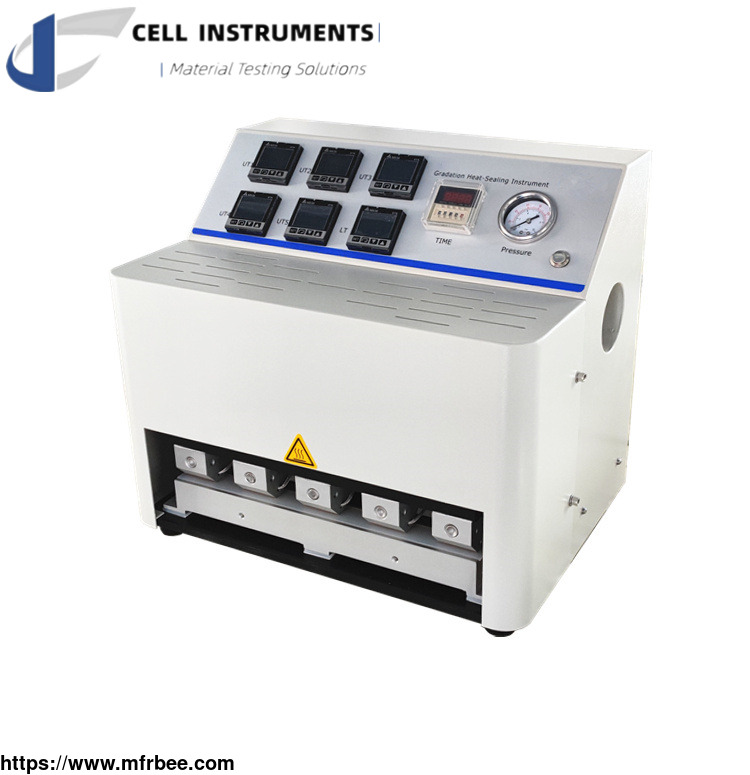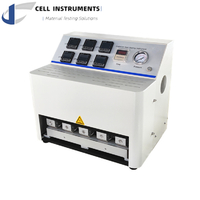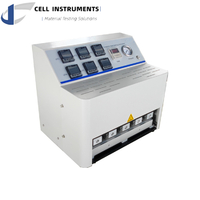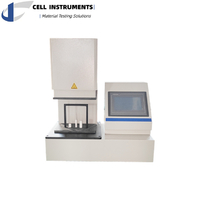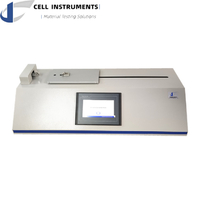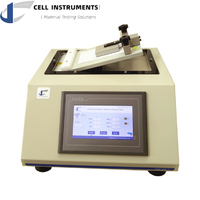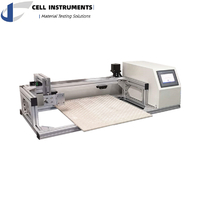GHS-01 Gradient Heat Seal Testing Machine ASTM F2029 Heat Seal Strength Tester
Product Quick Detail
- FOB Price
- USD $5,000.00 / Piece
- Minimum Order
- 1
- Place Of Origin
- China (Mainland)
- Sealing Temp.
- Ambient~250℃
- Temp. Gradient
- ≤20℃
- Deviation
- ±0.2℃
- Sealing Time
- 0.1S~9999S
- Sealing Pressure
- 0.15~0.7 MPa
- Seal Jaws(Mm)
- U:40*10 5PCS/L:330 1PCS
- Gas Input
- 0.7 MPa with Ф6 mm Pipe
- Power
- AC 220V 50Hz
- Packaging
- 1 set per box
- Delivery
- 3 Days
Specifications
GHS-01 Gradient Heat Seal Tester
Application
A Gradient Heat Seal Tester is an indispensable device within the packaging industry, specifically designed to assess the heat-sealing properties of a wide array of materials. These materials include films, laminates, and various packaging components. The strength and integrity of heat seals are paramount in ensuring the quality and effectiveness of packaging across industries such as food, pharmaceuticals, electronics, and more.
The operation of this tester involves subjecting a sample of the material under examination to specific heat and pressure conditions for a predetermined duration. This process effectively replicates the conditions under which heat seals are formed during the packaging process. By adjusting parameters such as heat, pressure, and time, manufacturers can ascertain the optimal conditions necessary for the creation of robust and consistent seals.
The term \"gradient\" in Gradient Heat Seal Tester alludes to its unique capability to generate a controlled temperature gradient across the sealing area. Essentially, this means that the device functions as a Multi-Station Heat Seal Tester, enabling tests to be conducted at varying temperature settings simultaneously. This feature significantly reduces waiting times between tests, thereby enhancing overall testing efficiency.
Standard
The GHS-01 Gradient Heat Seal Tester conforms to ASTM F2029-16(2021) standards, which outline the practices for creating laboratory heat seals. These seals are crucial for determining the heat sealability of flexible barrier materials, as measured by seal strength.
Technical Features
- Key to the effectiveness of a heat seal tester is its stability and accuracy concerning time, temperature, and pressure. The GHS-01 Gradient Heat Seal Tester incorporates advanced features to ensure optimal sealing results:
- PLC Control Unit and HMI Touch Screen: Facilitate precise control and monitoring of the sealing process.
- Aluminum Upper and Lower Jaws: Independently heated to minimize heat loss during sealing, ensuring temperature uniformity.
- P.I.D. Temperature Controller:Provides first-class temperature management for optimal heating.
- Proximity and Pressure Sensors: Ensure accuracy in dwell time and sealing pressure.
- Three-Way Guided Sealing Bar: Ensures uniform sealing pressure.
- User Protection Designs: Includes features such as an anti-scald front cover and manual/foot switch operation.
- Customizable Seal Jaws: Dimension, shape, and sealing surface/patterns can be tailored to specific requirements.
- Connectivity: Seamlessly integrates with professional software via the RS 232 port (optional).
Main Parameters
- Sealing Temp.: Ambient~250℃
- Temp. Gradient: ≤20℃
- Deviation: ±0.2℃
- Sealing Time: 0.1S~9999H
- Sealing Pressure: 0.15~0.7 MPa
- Seal Jaws(mm): U:40*10 5PCS/L:330 1PCS
- Gas Input: 0.7 MPa with Ф6 mm Pipe
- Power: AC 220V 50Hz
Test Process
During testing, a sample is placed between two parallel heated sealing jaws. Once the desired temperature equilibrium is achieved, the upper seal jaw, propelled by a gas cylinder, applies pressure to the sample for the specified duration. Upon completion of the sealing time, the upper sealing jaw retracts, concluding the heat-sealability testing process.
Heat Sealing Evaluation
The heatsealability of materials can be further evaluated through techniques such as air-leak testing, dye penetration, visual inspection, or microorganism penetration analysis.
With its advanced features and adherence to industry standards, the GHS-01 Gradient Heat Seal Tester stands as a reliable solution for assessing the heat-sealing properties of various materials, ensuring packaging quality across diverse industries.
- Country: China (Mainland)
- Market: Europe,Americas,Asia,Africa,Middle East,Oceania
- Contact: Owen Zhang
